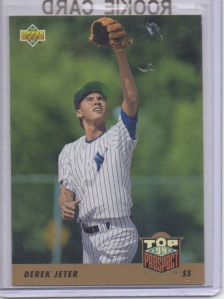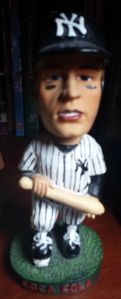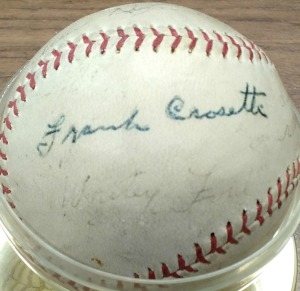This continues a series on the best Yankees at different positions. Today: shortstop.
1, Derek Jeter
This call couldn’t be easier.
I’ve already made the case that Derek Jeter is baseball’s best shortstop ever.
I’ve already noted that he’s one of the best players ever at any position.
I’ve already shown that his post-season performances amount to a full season, one of the best seasons ever, facing some of the best pitchers ever.
I’ve already noted that Jeter and Mariano Rivera are the best teammate tandem in baseball history.
What more can I say? He’ll be a first-ballot Hall of Famer, close to a unanimous choice despite the strong anti-Yankee bias of voters.
If Ozzie Smith, Cal Ripken Jr., Honus Wagner and Ernie Banks had been Yankees, this would at least be a contest. And Jeter would still win.
2, Phil Rizzuto
Phil Rizzuto is a pretty easy choice for this spot, too. Until Jeter is eligible, the Scooter is the only Yankee shortstop in the Hall of Fame. He played all 13 years of his career for the Yankees (with a three-year break for military service during World War II). He played all but two of his 1,649 career games at shortstop. He was the MVP in 1950. He was a five-time All-Star. He contributed to seven Yankee World Series championships and is sixth all-time in World Series games played, eighth in hits with 45, fourth in walks with 30 and tied for third in stolen bases with 10.
Rizzuto was the best American League shortstop of his time.
3, Bucky Dent
In my ranking criteria, I note that special moments are important to me. And few moments stand out more in Yankee history than Bucky Dent‘s home run to take the lead on Boston in the 1978 one-game playoff. He continued his hot hitting in the World Series, going 10-for-25 with 7 RBI and winning the Series MVP award.
Dent was an All-Star two of his six Yankee years. Based on regular-season performance, he wouldn’t rank this high and might not even make the top five. But Yankee shortstops are pretty tightly bunched behind Jeter and Rizzuto, and Dent’s October performance in 1978 pushes him ahead of the pack.
I have to give my wife, Mimi, some credit here: Earlier in the 1978 season, on July 3, Dent was coming to the plate in a game against the Red Sox. She liked his name and predicted he’d hit a homer. I condescendingly informed her that he was a singles hitter (he hit just 40 homers in his career and just five that season). But two of the homers were against the Red Sox: the one Mimi called in July and the one that propelled the Yankees into the post-season in October.
I generally don’t like sideline interviews before and during games. They are far more filled with clichés than insight or humor. But my favorite such moment was when Steve Lyons interviewed Dent during a Yankees-Red Sox playoff game (in 2003, I’m guessing). Lyons told Dent that he thought Red Sox fans might not know his real middle name, so Lyons asked what it was. Dent deadpanned “Earl.”
I don’t hold his awful 1989-90 managing tenure against him, but don’t look for him in my ranking of best Yankee managers.
4, Tony Kubek
Tony Kubek had a better post-playing career as a broadcaster than Dent had as a manager. But this is a ranking of shortstops, and I give Dent the nod based on his October 1978 play. But you could easily rank Kubek third.
He played nine years for the Yankees, compared to just six for Dent. But Dent played exclusively at short, 694 games. Kubek played more games at shortstop for the Yankees (882), but also played 145 games in the outfield and 55 at third base.
Kubek was a better hitter for the Yankees (.266 to .237) with more power (he hit 14 homers in 1960, and Dent never reached double figures in a season).
Kubek was a three-time world champion and three-time All-Star, one more than Dent on each count.
But Kubek hit .240 in 37 World Series games. Dent hit .349 in 12. Kubek’s career advantages in the regular season are not enough, in my view, to offset Dent’s spectacular play when it mattered most.
Kubek’s most memorable post-season moment was the bad-hop groundball that hit him in the throat in Game Seven of the 1960 World Series. It was a potential double play, but instead it left two runners on base with no outs in the bottom of the eighth inning. The Pirates went on to score five runs that inning, taking a 9-7 lead and setting the stage for Bill Mazeroski’s Series-winning homer after the Yankees tied the game in the top of the ninth. The bad hop wasn’t Kubek’s fault, but Dent’s big moments in the Red Sox playoff game and against the Dodgers in the World Series place him ahead of Kubek.
5, Frankie Crosetti
You could also rank Frankie Crosetti third or fourth. With 17 seasons as a Yankee, eight of them as the starting shortstop, and many more years coaching, Crosetti’s Yankee tenure seemed endless. His playing career spanned from the late years of Babe Ruth’s career to the early years of Yogi Berra’s.
Crosetti was a two-time All-Star, but was relegated to a backup role in 1941, Rizzuto’s rookie season. He led the league seven times in getting hit by pitches and in 1938 led the A.L. with 27 stolen bases. But Crosetti was a weak hitter, .245 for his career and twice leading the league in strikeouts. Though the Yankees won six of the seven World Series he played in, Crosetti hit only .174.
I feel comfortable ranking Dent and Kubek ahead of Crosetti, because they were better, but he played almost as many games at shortstop for the Yankees as the two of them combined. So he gets the fifth spot on the list.
The rest
The Yankees didn’t have a lot of great shortstops. Mark Koenig started four years, including for the great 1927 Murderer’s Row Yankees and hit .319 one year. Everett Scott was even more unremarkable as a three-year starter earlier in the ’20s. Leo Durocher, better known as a manager (but not for the Yankees), played two seasons at shortstop for New York.
You’d have to be a hard-core Yankee fan to remember the nine starting shortstops who filled the gap between Dent and Jeter. I couldn’t until I looked them up.
Joe Sewell, a Hall of Fame shortstop, finished his career with Yankees (1931-33), but he had moved to third base by then.
Update: Stuart Warner pointed out on Facebook that I omitted Tom Tresh. I liked Tresh as a young Yankee fan, but correctly remembered that he played more outfield than shortstop (only 351 games, including 1962, when he was an All-Star and Rookie of the Year. He doesn’t belong on the top-five list, but definitely among “the rest.”
Comparing shortstop traditions
There’s not a clear team with the strongest shortstop tradition, but the Yankees are in contention.
The Pirates (with Honus Wagner, Arky Vaughan and Rabbit Maranville) and Orioles (Cal Ripken Jr., Luis Aparicio and Bobby Wallace when they were the St. Louis Browns) each have more Hall of Famers at shortstop than the Yankees, even if you count Jeter before his election makes it official. The Giants had 19th-Century shortstops George Davis and John Ward, plus Travis Jackson, one of the most outrageous examples of how easy Hall of Fame selection has been for players from the 1920s).
The White Sox (Aparicio and Luke Appling), Cubs (Joe Tinker and Ernie Banks) and Indians (Lou Boudreau and Sewell) each match the Yankees with two Hall of Fame shortstops (counting Jeter).
I’m not going to study the other teams’ shortstops who didn’t make it to Cooperstown, but I’d guess the Pirates (who also had 1960 MVP Dick Groat) might have the best tradition, with the Yankees ranking about fifth.
Ranking criteria
I explained my criteria in the post on first basemen, so if this seems familiar, it’s because I cut and pasted that explanation here, then adapted it for shortstops.
If a player is in the Hall of Fame (Rizzuto) or bound to get there (Jeter), that carries considerable weight with me.
I rank players primarily on their time with the team, so Jeter, Rizzuto, Kubek and Crosetti stand out not just for their great careers, but because all their time was spent with the Yankees. Aparicio made it to Cooperstown and had Hall of Fame seasons for both the Orioles and White Sox, so he counts heavily for both teams, but not as heavily as Jeter or Ripken, who spent their full careers with one team. And Aparicio wouldn’t count much for the Red Sox, because his career was in decline when he reached Boston at age 37.
I value both peak performance and longevity, but peak performance more. That’s why Kubek finished ahead of Crosetti. Measures of peak performance, such as MVP awards and leading leagues in important stats, will move a person up my list. Rizzuto is the Yankees’ only shortstop MVP, but Jeter was too far ahead of him in other respects for that to matter and led the American League twice in hits and once in runs.
Few ballplayers actually matter in the broader culture beyond baseball, but Jeter did (maybe Dent, too) and that counted for them.
Time at the position is important, too. Banks had his best years at shortstop, so he counts heavily for the Cubs there, but he actually played more games at first base, so you can’t count his full career.
Post-season play and championship contributions matter a lot to me. I should add that I don’t consider those to be the same thing. Kubek and Crosetti contributed to more championships than Dent, but Dent played better in the post-season.
This factor didn’t play into any of these decisions, but if two players were dead even at a position for the Yankees, I would have moved the one with the better overall career ahead. For instance, if Dent and Kubek had been equal as Yankees, Dent’s four years with the White Sox, including one year as and All-Star and finishing second for Rookie of the Year another, would have broken the tie.
Special moments matter, too. Dent’s special moment, combined with the excellent World Series that followed, was a difference-maker here, separating him from both Kubek and Crosetti.
Who was best?
I wish the Polldaddy version with WordPress let you rank, rather than just voting for the best. I think I know how this will come out if people vote seriously:
Rankings of Yankees by position
Other rankings of Yankee shortstops
Source note
Unless noted otherwise, statistics cited here come from Baseball-Reference.com.




[…] Shortstop […]
LikeLike
[…] Shortstop […]
LikeLike
[…] Shortstop […]
LikeLike
[…] when he hit .333 (8-for-24) with nine runs scored, a homer, four RBI and two stolen bases. If Bucky Dent hadn’t been so hot, White might have been the Series […]
LikeLike
[…] Shortstop […]
LikeLike
[…] Shortstop […]
LikeLike
[…] Shortstop […]
LikeLike
[…] with Derek Jeter, the Yankees’ best shortstop, I’ve already written a lot about Mariano Rivera, not only […]
LikeLike
[…] You can’t even credit Stengel’s success to the Yankees’ talent. During that 12-year stretch, the Yankees had five Hall of Famers in their primes: Joe DiMaggio, Mickey Mantle (overlapping just a year), Yogi Berra, Whitey Ford and Phil Rizzuto. […]
LikeLike